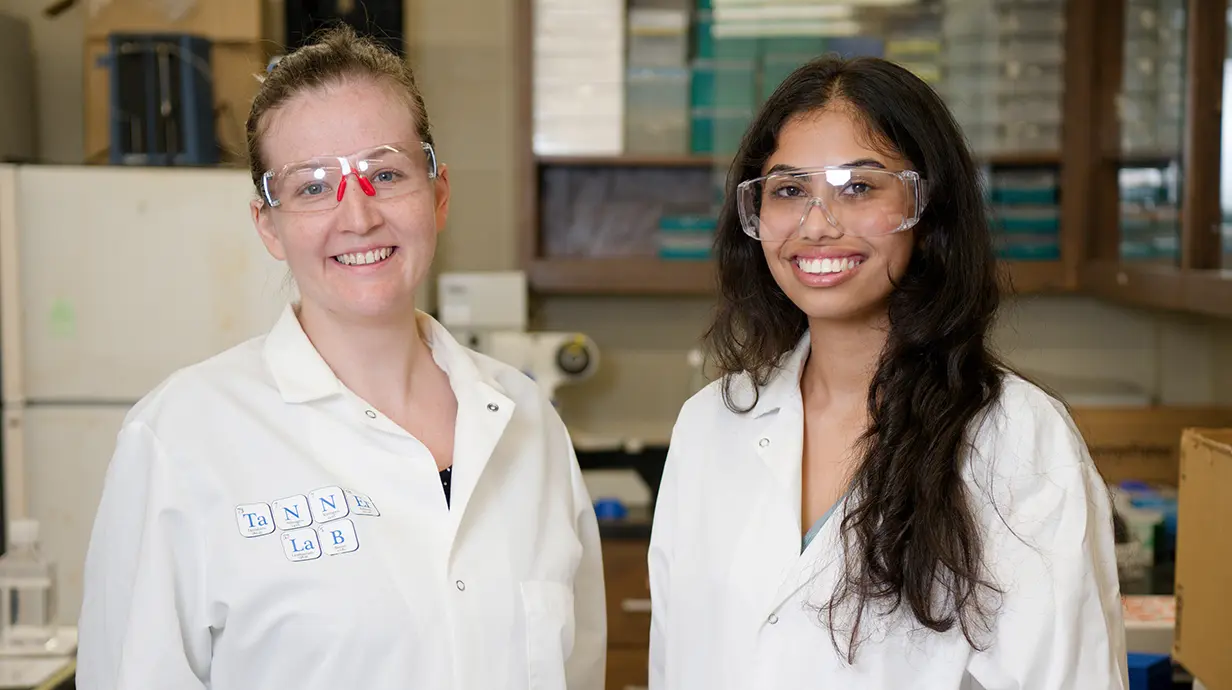A team of researchers at the University of Mississippi has discovered that coating cancer treatment carrying nanoparticles in a sugar-like material increases their treatment efficacy. They reported their findings in Advanced Healthcare Materials.
 Chemistry professor Eden Tanner (left) and Ole Miss junior Mira Patel head a team of researchers studying a novel way to deliver cancer-fighting medication for triple-negative breast cancer. Image Credit: Hunt Mercier/Ole Miss Digital Imaging Services
Chemistry professor Eden Tanner (left) and Ole Miss junior Mira Patel head a team of researchers studying a novel way to deliver cancer-fighting medication for triple-negative breast cancer. Image Credit: Hunt Mercier/Ole Miss Digital Imaging Services
Over a tenth of breast cancer diagnoses are for triple-negative breast cancer. Triple-negative breast cancer (TNBC) gets its name because it lacks three common targets: estrogen, progesterone, and HER2. It disproportionately affects young women, especially African American women, making it an urgent priority for new treatment strategies.
Mississippi has higher-than-average rates of triple-negative breast cancer. According to a 2024 study from the University of Mississippi Medical Center, 37 % of breast cancer patients treated there between 2016 and 2023 were triple-negative, more than double the national norm.
The aggressive character of this cancer, along with its resistance to several common therapies, results in a greater fatality rate than other cancers.
While this cancer may not increase the levels of usual drug targets, the Ole Miss research team discovered a unique technique to deliver cancer therapies directly to cancer cells.
It doesn't have any of the usual targets we've developed therapies for. That means we really had to think creatively about how to treat it. One thing that is consistent across all of the patients (with triple-negative breast cancer) is that they overexpress glucose transporters to bring more sugars to the cells. Essentially, it has a sweet tooth. So, how can we get it to take its medicine? We wrap it in sugar.
Eden Tanner, Assistant Professor, Chemistry and Biochemistry, The University of Mississippi
Tanner explained that by covering the nanoparticle cancer treatment with sugar, the researchers essentially “trick” the cancer into taking the drug.
When these sugar-coated cancer therapies are put into the bloodstream, they can “hitch a ride” on red and white blood cells. The drug goes through the body like a bus, eventually becoming stuck by the cancer’s glucose transporters.
Because triple-negative breast cancer cells overexpress GLUT-transporters, there is more of an affinity between the nanoparticles and those cells. This method could provide something that will change the way we treat this cancer in the future, and in a way that won't affect our regular, healthy cells.
Ole Miss junior Mira Patel, co-author of the study.
Triple-negative breast cancer is not the only disease that overexpresses glucose transporters; so, the drug delivery strategy might be applied to treat other diseases.
We haven't tested the technology on those other diseases yet, but there's a good reason to believe that a similar strategy might work. That is exciting news for diseases like colon cancer, brain cancer, and fatty liver disease, which also have high levels of glucose transporters.
Eden Tanner, Assistant Professor, Chemistry and Biochemistry, The University of Mississippi
However, the researchers must evaluate the delivery mechanism under disease settings before it can be implemented. Their findings have the potential to save lives in Mississippi since triple-negative breast cancer is so common there.
Journal Reference:
Dasanayake, G. S. et al. (2025) Glyco Ionic Liquids as Novel Nanoparticle Coatings to Enhance Triple-Negative Breast Cancer Drug Delivery. Advanced Healthcare Materials. doi.org/10.1002/adhm.202500592